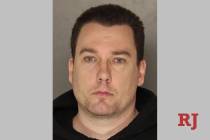Lawyers doubt new rules can stop tax evasion, money laundering, financial crime
CARSON CITY — Attorneys involved in creating limited liability corporations in Nevada and other states questioned Friday whether new rules announced by the White House to bring more transparency to the process are an overreach that won’t successfully combat tax evasion, money laundering and financial crime.
The attorneys, one based in Arizona and the other a longtime Las Vegas tax expert, also said the new rules could make it more difficult for people to form limited liability companies in states such as Nevada or Delaware.
Such rules would reverse years of effort to make the process as simple as possible to bring in revenue to states such as Wyoming and Nevada, sometimes called the Delaware of the West.
“I think it is much ado about nothing for most attorneys,” Las Vegas attorney Steve Oshins said. “Most of us believe that 100 percent of our clients, or close to it, are not laundering money or evading taxes.”
Oshins said he has had maybe two clients in 21 years who were later discovered to have being doing something wrong.
So the new rules, meant to address concerns raised as a result of the release of the Panama Papers, will make it more difficult for his clients to form corporations in Nevada, he said.
The Panama Papers are the corporate records of one global law firm, Panama City-based Mossack Fonseca, and they show how wealthy individuals have masked their identity and secretly stashed money around the globe. There’s nothing illegal about the use of offshore companies; in practice, however, tax cheats, money launderers and other criminals take advantage of the anonymity that these companies provide.
A Las Vegas company, M.F. Corporate Services, incorporated hundreds of limited liability companies linked to the Panama Papers. It is a subsidiary of Mossack Fonseca.
States such as Delaware, Wyoming and Nevada don’t require proof of identification when setting up a company, a task that can be accomplished in a few hours by paying only a few hundred dollars.
There are measures in Congress seeking to require more disclosure when such companies are formed.
Oshins said people who are trying to hide illegal activity don’t need to form a limited liability company to do so. They can form a general partnership in any state, keep the documents private and engage in their illegal activities, he said.
“Whatever loopholes they think they are closing won’t stop illegal activity,” Oshins said.
Richard Keyt, an Arizona business, contracts and entity formation attorney, echoed Oshins comments.
Although a shell company can be formed, the individuals still need a bank account and there are strict rules for opening bank accounts in the U.S., he said.
One new regulation announced by the Obama administration will require banks, securities brokers and dealers, mutual funds and other financial institutions to collect and verify personal information on the people who own, control or profit from companies that are their clients.
But if a company is owned by 100 people, Keyt asked if all 100 people will have to jump through hoops to open a bank account.
“My fear is government is overstepping its bounds,” he said.
“There are lots of valid reasons for owners of companies to keep the information confidential,” he said. “At what point does the government interest outweigh the interest of the individual?”
The bank rule was welcomed by disclosure advocates, however.
“Our view is that this should be the start of the due diligence, not the end of it,” Heather Lowe of Global Financial Integrity said about the proposed rule.
But Oshins said governments could accomplish much more if they went after clients of firms where illegal activity is a concern, rather than propose regulations that are a burden for the 99.8 percent of people who are not engaged in illegal activity.
States such as Nevada, Wyoming and Delaware have better corporate laws that allow the states to attract corporate filings to make money, he said.
“We shouldn’t be a target because our laws are too good,” Oshins said.
Contact Sean Whaley at swhaley@reviewjournal.com or 775-461-3820. Follow him on Twitter: @seanw801

































